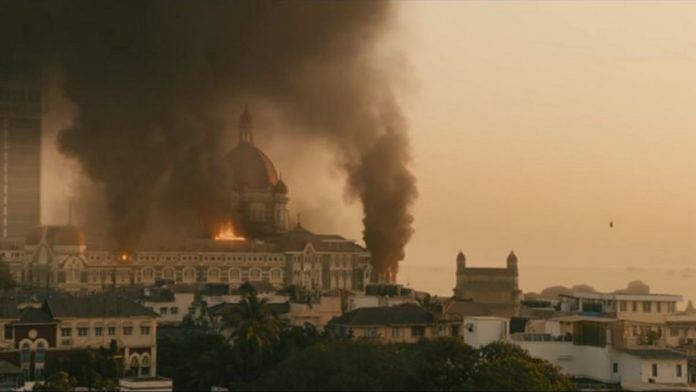It’s been 11 years since a group of 10 terrorists held the city of Mumbai hostage for three full nights, turning the city’s much-loved landmarks into war zones. That seems like a long enough time for one to be able to watch a movie about this siege without getting too affected, even on the anniversary of the attacks.
To think that, it turns out, is delusional. But while the tightening knot of tension in my neck could be an emotional reaction to watching what I saw play out live on TV 11 years ago, credit must also go to the director of Hotel Mumbai, Anthony Maras, his writing partner John Collee, cinematographer Nick Remy Matthews, set builder Scott Ashenden and music composer Volker Bertelmann.
With tight action shots, footage from TV news archives, an assured lens and detailed set design to capture the beauty of Mumbai and earnest performances from leads Dev Patel and Anupam Kher, they create a gripping story of terror, courage, kindness and humanity. Unfortunately, gripping is not good enough.
Because when it is a subject so close to us, we know we will be gripped anyway. Even a bad movie on 26/11 would have us at the edge of our seats. And Hotel Mumbai is not a bad movie. It just does not do justice to the events of November 2008.
We all know that on 26 November, heavily armed Pakistani terrorists sailed into Mumbai and unleashed a bloodbath for nearly 60 hours on the city’s landmarks, including CST Station (more popularly called VT), Cafe Leopold (which, in the film, is bizarrely called Lilopal), Nariman House, Cama Hospital, the Trident Hotel and the Taj Mahal Palace Hotel. The film chooses to focus on the Taj, its guests and staff.
The title is an obvious nod to Hotel Rwanda, the 2004 Don Cheadle starrer about a hotel under siege during the Rwandan genocide. It’s meant, one supposes, to invoke the idea that the iconic hotel stands for the city.
While it makes sense to focus on a site that was held hostage the entire duration of the attack, rather than a shootout in a street like the one in the lane behind the Times of India building, it does seem like a convenient excuse to focus on the Western victims of the attacks, many of whom were at the two hotels, and to cater to a Western audience. This would still be all right if the guests in question were at all interesting.
David and Zahra (Armie Hammer and Nazanin Boniadi) are newly married parents to a baby, and the three are staying at the hotel with the nanny Sally (Tilda Cobham-Hervey). Vasili (Jason Isaacs) is a sleazy Russian tycoon who takes it upon himself, for reasons unexplained, to protect Zahra. The four have no interesting back story to their characters that makes one root for them over anyone else. They could have been replaced by literally anybody, and the film would have been no poorer for it.
Also, the film would have benefitted from a wider look at the other sites under attack — barring some cursory footage of VT Station since that’s where the siege began, there is nothing else to really give a sense of what was going on in the rest of the city. (The film, oddly, ends on 27 November, when the siege was not even halfway over.)
Even if it was just via TV screens at the hotel, it would have made for a far more compelling and comprehensive story to get a larger picture of what the attacks were doing to Mumbai. And beyond a point, the repeated footage of the Taj’s exterior, with smoke billowing out around the dome, is tiresome.
What the focus on the Taj does, though, is shine a light on the extreme kindness, quick thinking and courage displayed by the hotel staff. Kher plays head chef Hemant Oberoi (the only real-life person to be named and portrayed specifically; the rest are amalgamations of various real-life people) with restraint and dignity, while Patel, as his waiter Arjun, is earnest, panicked and decisive in all the right doses. Together, they and their team go above and beyond the call of duty to protect their guests, hiding them in a private lounge with a heavy door, helping them exit via the back, risking their own lives to get them medical aid.
The focus on the hotel also allows the filmmakers to reiterate the fact that the media was giving out crucial information to the terrorists in real time, and that Mumbai Police were severely ill-equipped to deal with this kind of coordinated serial attack and hostage situation, and had to wait for the NSG to arrive from Delhi. But the NSG’s appearance in the film lasts precisely five minutes — as if their arrival magically eliminated the gunmen.
Also, of course, at the time of the attack, no one knew where the terrorists were from, so it is understandable that the words Pakistan or Lashkar-e-Taiba don’t come up in the movie. But before the end credits roll, the makers do take the time to remind audiences of a few facts about the attacks. While they mention then that the attackers were Pakistani, and mention David Headley, Tahawwur Husain Rana and Hafiz Saeed, they neglect to mention Zaki-ur-Rehman Lakhvi at all, or that a couple of these masterminds of the attacks are still at large. They needn’t have presented these facts at all, but since they do, one wishes it was done correctly and completely.
Ultimately, one is struck by the sense that while it has all the elements of an action flick, as an emotional thriller based on a true story, Hotel Mumbai simply doesn’t do justice to its subject.
Also read: Honey traps, deepfakes, AI: Why India’s RAW needs to prepare for threats beyond terrorism



